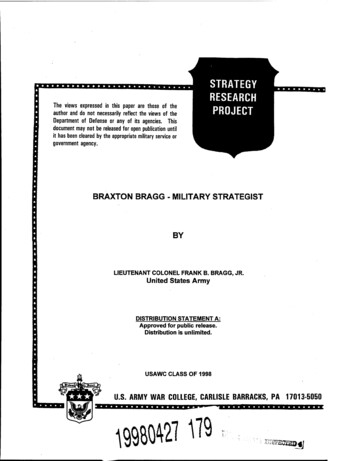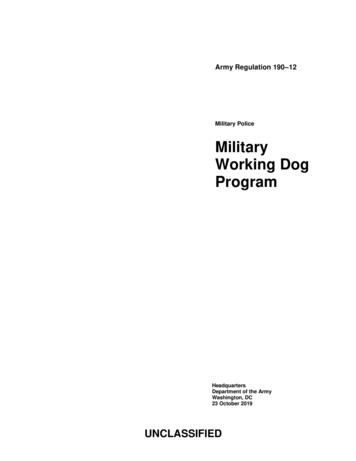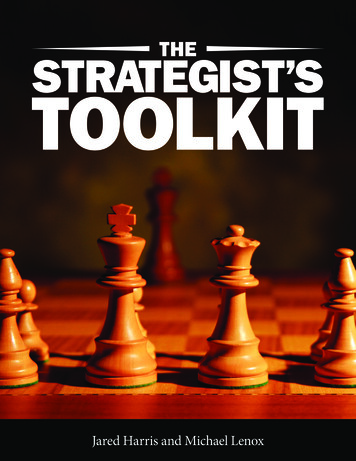
Transcription
» ,The views expressed in this paper are those of theauthor and do not necessarily reflect the views of theDepartment of Defense or any of its agencies. Thisdocument may not be released for open publication untilit has been cleared by the appropriate military service orgovernment agency.STRATEGYRESEARCHPROJECTBRAXTON BRAGG - MILITARY STRATEGISTBYLIEUTENANT COLONEL FRANK B. BRAGG, JR.United States ArmyDISTRIBUTION STATEMENT A:Approved for public release.Distribution is unlimited.USAWC CLASS OF 1998U.S. ARMY WAR COLLEGE, CARLISLE BARRACKS, PA 17013-5050""19980421 Wmimiimmemmw*j
USAWC STRATEGY RESEARCH PROJECTBraxton Bragg--Military StrategistbyLieutenant Colonel Frank B. Bragg, Jr.Dr. Boone BartholomeesProject AdvisorThe views expressed in this paper are thoseof the author and do not necessarily reflectthe views of the Department of Defense or anyof its agencies. This document may not bereleased for open publication until it hasbeen cleared by the appropriate militaryservice or government agency.DISTRIBUTION STATEMENT A:Approved for public release.Distribution is unlimited.U.S. Army War CollegeCARLISLE BARRACKS, PENNSYLVANIA 17013
IX
ABSTRACTAUTHOR:Lieutenant Colonel Frank B. Bragg, Jr.TITLE:Braxton Bragg--Military StrategistFORMAT:Strategy Research ProjectDATE: 01 April 1998PAGES: 43CLASSIFICATION: UnclassifiedBraxton Bragg progressed through a diverse and demandingcareer to become a military strategist and ultimately General-inChief of Confederate States of America (CSA) Armies.GeneralBraxton Bragg devoted over four years, of his life to senior CSAArmy leadership positions, mostly in command.He surpassed everygeneral officer in the CSA and Union in holding such a wide rangeof senior officer responsibilities.Bragg observed closely andoperated in and around the operational and strategic environmentfor the majority of his life.By virtue of his previous duties,assignments, and experiences, Bragg observed, participated in,and influenced hundreds of meetings and decisions that are bestdescribed as "strategic art."He developed his strategiccompetencies through: civilian and military education; anhonorable, diverse, demanding, and rare service and assignmenthistory; and, life-threatening experiences that only a few wouldever taste.Braxton Bragg strategized with the best experts ofhis day.in
IV
TABLE OF CONTENTSABSTRACTPREFACE. . . .iii. .viiBRAXTON BRAGG--MILITARY STRATEGIST . 1PART I; BRAGG'S DEVELOPMENT2THE EARLY YEARS (1817 to 1837).'. THE LIEUTENANT YEARS (1837 to 1845) .WRITER AND AUTHOR (1840'S AND BEYOND)2":THE MEXICAN WAR YEARS (1845 TO 1848). . . . 356NATIONAL HERO, MARRIAGE, AND NEW ASSIGNMENTS (1848 to 1855) 7FARMER and BUSINESSMAN (1856-1860)9CIVILIAN PUBLIC SERVANT and POLITICIAN (1857 to 1860) . 10PART II: CIVIL WAR (1861 TO 1865). 11WILL BRAXTON BRAGG BE THE FIRST CSA SECRETARY OF WAR? . 12BRAXTON BRAGG'S CSA ARMY SERVICE AND ASSIGNMENTSBRAXTON BRAGG AS A STRATEGIST. 1316BRAXTON BRAGG' S MAJOR CONTRIBUTIONS . . . .20BRAGG'S HONORABLE CHARACTER25CONCLUSION .-.'ENDNOTESBIBLIOGRAPHY.2829. 31.
VI
PREFACEGeneral Braxton Bragg, you have the misfortune of beingregarded as my personal friend, and are pursued,therefore, with malignant censure by men regardless oftruth and whose want of principle to guide theirconduct renders them incapable of conceiving that youare trusted because of your known fitness forcommand. .— President Jefferson DavisThe press of the country did [Bragg] great injustice.— Brigadier General Arthur Middleton ManigaultThe only enemies [Bragg] had were a few bad Generalsand some newspaper editors. — General Joseph WheelerThe future Historian in chronicling the events and thelives of our great men, will hoist on high the name ofBraxton Bragg, as synonymous with cool courage,consummate bravery, and determined devotion to thecause he espoused and served so well.— Major Simon MayerThe army under Bragg fought--and fought skillfully-some of the fiercest battles in the history of theworld's wars. General Bragg's place in the annals ofwar must always remain large where the records arecorrectly read.— Don C. SeitzLet us, then, try to place him before our readers, voidof all party feeling, and strictly as we find thingshonestly recorded.— Captain William P. SnowVll
Vlll
As an Army ROTC cadet at Mercer University, Macon, Georgia,25 years ago, I began my journey as a student of General BraxtonBragg. Over these past two and a half decades, I have examinedevery book I could get my hands on that speaks of Braxton Bragg.Although I did not read every book in its entirety, I did examineevery entry that referenced Braxton Bragg. Clearly, he was not"Mr. Collegiality," but if Braxton Bragg was alive today, hecould easily win a "defamation of character" court case.This paper will examine the positive aspects of Bragg's lifethat are routinely ignored by historians. I have deliberatelydismissed the criticisms heaped on Bragg. One of the surest waysto turn a student away from a love of history is for the studentto find in his books and readings only passages that embellishthe negatives, most of which are not true. Although this paperdoes not rehabilitate Bragg's reputation, it will lay out"things" a bit differently (truth and accuracy) than some of ouresteemed historians have done. If nothing else is achieved,perhaps some readers will come away with some incontestablepositive aspects of Bragg's accomplishments and relook thedetails of Bragg's contributions.Of the six military officers to rise to the highest rank offull General in the regular Confederate Army, Braxton Bragg isthe most defamed. Many of our Civil War history books arethreaded with mostly negative assessments and snippets of Bragg'sactions and behavior. There is no doubt that the anti-Braggclique led by the Reverend Leonodis Polk with the helpful aid ofmuch of the press had too much influence and dominated theperception of Bragg in our Civil War history. Why do so manyhistorians paint a completely negative, mean portrait of BraxtonBragg, when there is so much more documented evidence thatdisputes the negatives? This' paper will accentuate the positiveattributes of Braxton Bragg, and will not refight the Civil Warbattles in which he participated. Bottom line up front: Bragg isone of the great military strategists of the Civil War.XX
X
BRAXTON BRAGG--MILITARY STRATEGISTJefferson Davis failed to recognize the value of takingadvantage of Bragg's capabilities as a strategist andorganizer by placing him in a high office such as chiefof staff of the armies early in the war.— W. J. WoodAlthough very tardy in making the decision, ConfederateStates of America (CSA) President Jefferson Davis recognized Braxton Bragg's administrative genius, mastery of strategy, andwisdom of the workings of the armies in the field, and finallyappointed Bragg as General-in-Chief of CSA Armies, February 24,1864.Bragg was one of only six men who ever became a fullGeneral in the regular Confederate army. A veteran of threewars, he spent his life in heroic service in the cause ofcountry.Bragg's. closest friend, Union hero General William Tecumseh"Cump" Sherman, who knew Bragg better than anyone other than Mrs.Braxton Bragg and family, offered these comments of Bragg: "Ithink I knew Bragg as well as any living man, appreciated hisgood qualities, and had charity for his weaknesses.[and as thereplacement for Beauregard].Bragg [was] a man of more ability-of greater powers of organization, of action, and discipline
[and].great integrity."Bragg's journey to full General andmilitary strategist was certainly no surprise to Cump Sherman.Historians do not give much attention to Braxton Bragg as amilitary strategist.However, Braxton Bragg progressed through adiverse and demanding career to become a strategist andultimately General-in-Chief of CSA Armies.The purpose of thispaper is to present a portrait of Braxton Bragg, devoid ofgraffiti, that accentuates his positive attributes andachievements.In looking at General Bragg, it is helpful to viewhis life and development in a chronological context.PART I; BRAGG'S DEVELOPMENTTHE EARLY YEARS (1817 to 1837)Braxton had developed in physical and intellectualstrength and character each year at West Point, hisfinal class rank was considered highly honorable.—General Joseph HookerBraxton Bragg was born March 22, 1817, in Warrenton, NorthCarolina.He was welcomed into an industrious family thatbelieved in higher education, a demanding work ethic, and publicservice.Surrounded by loving parents and high achievingsiblings, including five brothers and six sisters, a great dealwas expected of the youthful Braxton Bragg.
Braxton excelled in all academic areas.He was a standoutstudent in mathematics and Latin for nine years at Warrenton MaleAcademy.At the ripe old age of 16, Bragg was appointed a cadetto the United States Military Academy at West Point.Hecontinued to be an outstanding student, which formally culminatedin his graduation with distinction, fifth of fifty, in his WestPoint class of 1837.Twenty-year old Braxton Bragg galloped out of West Point as aSecond Lieutenant in the United States Army.He was an engineer,scholar, accomplished equestrian, and top ten per-center.Moreimportantly, Bragg was a military officer who possessed a passionto discuss, debate, write about, and contribute to military andpolitical matters.THE LIEUTENANT YEARS (1837 to 1845)Yesterday, I received a letter from General Gaineswhich called Scott *a vain glorious dabbler inpolitics" who wanted to establish *a prison disciplinein. the army."Gaines particularly deplored Scott's iniquitous attempt to crush that talented youngofficer Lieutenant Bragg."— Congressman James G. ClintonLieutenant Braxton Bragg began his active duty immediatelyafter graduation and headed to Florida as ä member of the ThirdArtillery.(Ironically, he began his CSA Army generalship in
Florida, too.)Bragg was involved primarily in a supporting rolein this low-intensity conflict, guerrilla type action, fightingSeminole Indians.Initially serving' in positions as assistant commissaryofficer and regimental adjutant, Bragg did not see any combat.Due to poor health, which he endured throughout his lifetime, in1840, he managed an assignment as a recruiter in New York Cityfor several months.Returning to Florida from recruiting duty,Bragg assumed company command, which included commanding FortMarion for part of that tenure.In 1843, Third Artillery moved to Fort Moultrie, SouthCarolina.Bragg continued in command, and most surprising ofall, he survived a court-martial conviction.He was found guiltyof "disrespect toward his superiors," a badge of honor he woreproudly until the day he died.First Lieutenant Braxton Braggwas certainly not a "yes" man.He offered constructive criticismand creative thinking to his superiors, something that the chainof command, including the Secretary of War, certainly did notappreciate.Ironically, Bragg was correct, and he received anoutpouring of support from some members of Congress and othersenior Army officers.
WRITER AND AUTHOR (1840's AND BEYOND)Bragg was the author of many essays relating to hisprofession and many other subjects, able and practical,and always free from the sickening egotism which fillthe works of some of our more recent Army authors.— General Joseph HookerLieutenant Bragg contributed immeasurably to military thoughtof the 1840's.Particularly noteworthy was his series of ninearticles published in the Southern Literary Messenger during 1844and 1845.Bragg's recurring theme was army reform.two important ways to improve the army:He offeredfirst, the many separatestaff bureaus should be unified under one chief; and, second,staff assignments should be rotated so that all officers couldlearn staff duties.First Lieutenant Bragg's appeal for army reforms was ignored.No significant staff changes were made until 1903, when Congressadopted a program suggested by Secretary of War Elihu Root. 4Atthe heart of this new system was what Braxton Bragg had proposednearly sixty years before--the establishment of an integratedbureau organization headed by a chief of staff and the abolitionof permanent staff assignments.
THE MEXICAN WAR YEARS (1845 TO 1848)Bragg was.a distinguished veteran of the campaignsof northern Mexico, whose bravery and skill had won himthree brevet promotions--no other officer in the armyhad received more.— Grady McWhineyFate, luck, and good fortune came to Bragg on June 18, 1845.He was ordered to join General Zachary Taylor's army for thedefense of Texas against Mexico.For three exhausting years,Braxton Bragg commanded an artillery battery or company, risingfrom First Lieutenant to brevet Lieutenant Colonel.Bragg wastested in the heat of numerous battles and exhibited audacity,courage, and independent action.Historian Stewart Sifakis saidof Bragg, "his battery of 'flying artillery' revolutionized, inmany respects, the battlefield use of that arm."Bragg was the hero of one the most remarkable and famousbattles of the Mexican War--the Battle of Buena Vista on February23, 1847."Captain Bragg. saved the day," reported GeneralZachary Taylor.7Later, General Joseph Hooker would callTaylor's statement "the highest praise ever awarded an officerof[Bragg's] rankon the battlefield."8established himself as the commander to emulate.Braxton BraggHe henceforth
carried a reputation for the highest ideals of preparation,discipline, and competency.NATIONAL HERO, MARRIAGE, AND NEW ASSIGNMENTS (1848 to 1855)Of those who shared in the glory of Zachary Taylor'sMexican War triumph at Buena Vista on February 23rd,1847, Braxton Bragg stood foremost.— Curt Johnson and Mark McLaughlinIn June 1848, Brevet Lieutenant Colonel Braxton Braggreturned home from Texas and Mexico as a national hero.He wasthe "toast of the town" everywhere he traveled and treated asthough he alone had won the war.Bragg made many publicappearances and speeches as he traveled around the United States.He attempted to use his new influence for army reform.Much tohis credit, Bragg praised the "rank and file" of the army andinsisted that the enlisted men and company-grade officersdeserved the credit for the American victory in Mexico.In January 1849, Bragg's life changed for-the-better andforever.He accepted an invitation to visit Thibodaux,Louisiana, and met his future wife, Eliza Brooks Ellis, whileattending a ball in his honor.They were married on June 7,1849, less than five months after meeting each other.
Mrs. Braxton Bragg,'who preferred to be called Elise, was ahuge influence on Braxton in all matters.Elise was wealthy,smart, opinionated, and believed and said of Braxton, "he istruth itself, firm, unbending with principles most exalted."Almost immediately after getting married, Braxton and Eliseheaded for Jefferson Barracks, Missouri.Brevet LieutenantColonel Bragg restored his command and renewed his efforts forarmy reform.Much of his time was spent traveling the frontier,reading, writing, and engaging in the issues of the day.On October 31, 1853, Braxton and Elise were reassigned, withhis artillery battery, to Fort Gibson, Cherokee Nation, locatedon the Arkansas River in what is now northeastern Oklahoma.Eight months of primitive living conditions, harsh weather, andthe threat of Indian attacks took their toll.This was thebeginning of the end for Braxton Bragg's career in the UnitedStates Army.For the next six months, Braxton and Elise were assigned toFort Washita near the Texas border.Conditions were no betterand in April 1855, the Braggs departed on leave for Thibodaux,Louisiana, never to return.Braxton fought the good fight forarmy reform and equipment modernization, to no avail.Ironically, the United States Secretary of War, Jefferson Davis,
drove Braxton out of the United States Army.Bragg resigned andbegan a new adventure in Louisiana.FARMER and BUSINESSMAN (1856-1860)By 1860 Bragg's methods seemed successful. The censusof 1860 verified Bragg's prosperity.Listed as afarmer, he reportedly owned 1,640 acres of landconservatively valued, together with machinery andlivestock, at 101,900.the estimated value of hispersonal estate was 120,000.By standards of thetime, he was a rich man.— Grady McWhineyIn February 1856, Braxton Bragg began his new career--as a"farmer."Immediately after purchasing a sugar plantation northof Thibodaux, Louisiana, he started a new livelihood on a newestate--which he named "Bivouac."Again, Bragg was verysuccessful.Bragg studied, planned, and worked as a farmer with the sameintensity and work ethic he applied to everything else he hadpursued in the past."My crop was finished on the 12th, and isby far the most profitable one I have made--giving me a netprofit of 30,000," he boasted in December 1859.11For fiveyears he had no holiday; only after his health deteriorated, andon doctor's orders, would he spend a few weeks in themountains.12During the Civil War, Bragg recalled and applied
many of the skills learned with the risks of owning and managinga huge plantation.CIVILIAN PUBLIC SERVANT and POLITICIAN (1857 to 1860)As Bragg became economically successful, he took a moreactive interest in public affairs. He had always beenconcerned with politics, and even as he struggled withthe art of planting he watched the national scene.— Grady McWhineyBragg was raised with a keen sense of public service. Two ofBraxton's brothers were prominent government leaders, politiciansand legal scholars.Thomas Jr. served as United States Senatorand Governor of North Carolina and would become Attorney Generalof the CSA.John, the oldest brother, served as a statelegislator for North Carolina, and state supreme court judge andcongressman for Alabama.Both of these brothers served asconfidants and advisers to Braxton on key national andinternational issues of the day.Bragg's initial step in the civilian public service arenacame by accepting local government appointments as LeveeInspector and School Director.public office as a Democrat.attempt was a success.In 1859, he agreed to run forHis first and only elective officeBragg was elected Second DistrictCommissioner on the Louisiana Board of Public Works.10In this
capacity, Bragg designed, planned, and implemented the levee anddrainage system that allowed Louisiana to reclaim a vast amountof land for farming.Bragg's lifelong interest in higher education was the "spark"that allowed his direct involvement with the establishment andsustainment of the new Louisiana Military College at Alexandria,Louisiana, which became Louisiana Sate University.He was veryhelpful to William Tecumseh "Cump" Sherman, his devoted friendand first president of the college.Sherman commented,"Bragg.put me in such good relation with his friends thatreally they overcame me with zeal." 13On December 12, 1860, the Louisiana-Governor appointed Braggto his final civilian public service position prior to the CivilWar, a member of the state military board.Additionally, he wasthe Governor's military aide and a Colonel in the LouisianaMilitia.In less than two months he was appointed Major Generaland Commander of the Louisiana State Army.* PART II: CIVIL WAR (1861 TO 1865)The Union is already dissolved. The only question nowis:can we reconstruct any government withoutbloodshed?— Braxton Bragg to "Cump" Sherman, December 26, 186011
WILL BRAXTON BRAGG BE THE FIRST CSA SECRETARY OF WAR?Davis had wanted Braxton Bragg, who helped save the dayat Buena Vista, to head the War Department.— Hudson StrodeBraxton Bragg joined the CSA as an accomplished 43 year oldman.He succeeded at everything he attempted.Bragg had provenhimself as: student and scholar; writer and author; militarycommander and leader; speaker and orator; public servant,civilian government leader and politician; and, businessman,entrepreneur, farmer, and engineer.Braxton Bragg was and had been friends with industry leaders,senior military leaders, state legislators, congressmen,senators, governors, cabinet members, presidents of both the USAand CSA, and foreign dignitaries.He enjoyed a 360 degree viewof the highest level of political processes, mostly as an ardentDemocrat.Bragg observed closely and operated in and around theoperational and strategic environment for the majority of hislife.For these sound reasons, CSA President Jefferson Davis'sfirst choice to be the CSA Secretary of War was Braxton Bragg.Ultimately, internal politics involving the Cabinet and Congressled Davis to choose someone not even on his short list.12There
was much hope among professional soldiers, throughout the war,that Bragg would be appointed Secretary of War, but to no avail.On March 23, 1862, Jefferson D. Bradford (nephew of JeffersonDavis) wrote to President Davis, "I hear a great deal of talkabout your making General Bragg Secretary of War, as far as myknowledge and judgment goes I think you could not make a betterselection or one that would give more lively satisfaction andconfidence to the Army which he has so long commanded.He is oneof the coolest men I have ever seen in danger, a shell burstwithin a few paces of him during the bombardment at Pensacola,and as the sulphur gained our nostrils, he turned round to us andwith a smile said "Young gentlemen you smell your powder." 14BRAXTON BRAGG"S CSA ARMY SERVICE AND ASSIGNMENTSBragg.no General has more public confidence andadmiration.Your praise is on the lips of every man.Mr. (Secretary of War Judah P.) Benjamin told me thatyou were vxfche greatest General we had."PresidentxsDavis said to me that you (were) . . . the only Generalwho had accomplished all you undertook."— Congressman James L. Pugh, March 16, 1862Bragg devoted over four years of his life to senior CSA Armyleadership positions, mostly in command.General Braxton Braggsurpassed every general officer in the CSA and Union in holdingsuch a wide range of senior officer responsibilities.13
His CSA Army appointments, promotions, and assignmentsincluded: Colonel, Louisiana Militia (early 1861); Major General,Louisiana Militia (early 1861); commanding Department ofLouisiana (February 22-March 1861); Brigadier General, CSA (March7, 1861); commanding Pensacola, Florida (March 11-October 29,1861); Major General, CSA (September 12, 1861); commandingDepartment of Alabama and west Florida (October 14, 1861-February28, 1862); also commanding Army of Pensacola (October 29-December22, 1861); commanding Army of the Mississippi (March 6-17, May 7July 5, August 15-September 28, and November 7-20, 1862);commanding II Corps, Army of the Mississippi (March 29-June 30,1862); General, CSA (April 12, 1862); commanding Department Two(June 17-0ctober 24, 1862 and November 3, 1862-July 25, 1863);commanding Army of Tennessee (November 20, 1862-December 2,1863); also commanding Department of Tennessee (August 6-December2, 1863, except for briefly in August); General-in-Chief of theCSA Armies (effective February 24, 1864); commanding Departmentof North Carolina (November 27, 1864-April 9, 1865, but underJoseph E. Johnston from March 6, 1865); and, supervising Hoke'sDivision, Hardee's Corps, Army of Tennessee (April 9-26, 1865).His experience with (and confidence held by) Jefferson Daviswas certainly the deciding factor in Bragg's promotion to full14
General and ascendancy to General-in-Chief of the CSA Armies onFebruary 24, 1864.However, Historian Grady McWhiney writes:Bragg, it is often charged, received promotion to fullgeneral only because he and President Davis had longbeen friends.Such was not the case.One reason whyBragg resigned from the United States Army was becausehe disliked Davis, who was then Secretary of War.In1855 Bragg informed his friend William T. Sherman, "Tojudge from high sounding words in reports and billsbefore Congress, Mr. Jeff. Davis intends to have anArmy after his own heart (not a very good one by theway) . We are all to be placed at his mercy, and to beplaced at his mercy, and to be rearranged to suit hispleasure and convenience."Bragg considered Davis "agood deal of the pettifogger and special pleader."Years later Sherman recalled that "Bragg hated Davisbitterly" for sending him to the frontier, "as Braggexpressed it 'to chase Indians with six-pounders[cannons]'."Bragg's elevation to the position of General-in-Chief ofCSA Armies automatically ensured his "official" role as astrategic leader.By virtue of his previous duties, assignments,and experiences, Bragg observed, participated in, and influencedhundreds of meetings and decisions that can best be described as"strategic art."Bragg's broad-based experience transcended merely thetheoretical and academic understanding that many CSA seniormilitary leaders possessed.He was a participant and leader indeveloping strategies that overlap between theater, nationalmilitary, and national security.His boundless experiences and15
travels made him one of only a handful of men in the nation thathad formulated and developed in their minds a "strategic andoperational intelligence preparation of the battlespace."By-accepting President Jefferson Davis's offer and plea to take theposition of General-in-Chief of CSA Armies, General BraxtonBragg's long road of preparation was complete.BRAXTON BRAGG AS A STRATEGISTBragg had few peers in the grasp of strategy and itsapplication on the highest military level.— W. J. WoodBragg developed his strategic competencies through: civilianand military education; an honorable, diverse, demanding, andrare service and assignment history; and, life-threateningexperiences that only a few would ever taste.He could and didstrategize with the best experts of his day.Soon after being promoted to Major General and while servingas Commander of Alabama and West Florida, Braxton Bragg perceivedthe fault in Jefferson Davis's national strategy in deployingforces for coastal defense instead of concentrating them wherebadly needed to counter invading Union armies in areas likeTennessee.1Bragg expressed himself forcefully in letters to16
Richmond, where Davis soon recognized the wisdom of Bragg'sadvice. 17Bragg wrote:It is a great misfortune that our limited means shouldbe so much dispersed.We are being whipped in detail,when a vigorous move with our resources concentratedwould be infinitely more damaging to the enemy.Ihaveurgently advised our governmenttoceaseprotecting property, and apply all its means to thediscomfiture of the enemy--the only strategic points tobe held in the gulf are' New Orleans, Mobile, andPensacola. All else should be abandoned at once.Itwould double our resources, and enable us to aid thosebehind us.It was mainly Bragg's concept of rapid concentration followedby a swift and aggressive offense that made possible surprise ofGrant's army at Shiloh.19Of particular note, Bragg's personalsupervision and vigorous command actions kept up the momentum ofthe attack at Shiloh.The Confederate Cavalryman JosephWheeler praised Braxton Bragg for his understanding of theoffensive, "Bragg.fully appreciated the fact that, when anadversary is not intrenched, a determined attack is the beginningof victory."21Historian William C. Davis wrote, "of all theConfederate Army commanders, Bragg led more offensives than anyother except Lee." 22In July 1862, General Bragg conceived'a strategic plan thatwas as bold as it was grand in concept, the invasion ofKentucky.23Historian, Lawrence L. Hewitt, wrote:17
"The Confederates had invaded Federal territory,whether Kentucky was a border state or not. During thecourse of the campaign, they had recaptured the strongdefensive position atCumberland Gap;they hadvirtually annihilated the Federal force sent toRichmond, Kentucky, to stop the movement before it wasunderway, and they had captured a garrison of over4,000 men at Mundfordville. In addition, Bragg had wona tactical victory against odds of almost four-to-one.Following this engagement,the confederates wereallowedto makeanalmostunharassedretreat,undoubtedly giving the impression to many Northerners,Southerners, and Europeans alike that the Confederatescould come and go almost as they pleased, regardless ofthe odds.Bragg had so maneuvered his forces thatnorthern Alabama, Middle Tennessee below Nashville, andEast Tennessee were Cleared of Federal troops. Bragg'sstrategy had forced Major General Ulysses S. Grant todetach a considerable force from West Tennessee to aidBuell, and in doing so, Grant was held in check untillate in the year by the small force that Bragg had leftbehind in Mississippi under Van Dorn and Price; aportion of Van Dorn's command had also established asecond bastion on the Mississippi River at Port antial stretch of the waterway as well as the RedRiver. Moreover, the Federal threat to Chattanooga, animportant base for offensive operations for eitherside, was abated for an entire year.Bragg'scampaigning by maneuver should have become the primaryConfederate strategy in the Western theater.Even ifthe invasions were to fail, the maneuvers would upsetFederal plans and would delay their penetration of trated what a single individual could accomplishwhen charged with the defense of the entire WesternTheater.Between June and October of 1862, Braggdisplayed greater abilities at grand strategy than didany other Confederate commander during the entire war;he had accepted responsibility for key positionshundreds of miles from his headquarters and hadsuccessfully held them for the Confederacy." 2418
The Kentucky campaign displayed Bragg's superior skills as anorganizer, trainer of troops, strategist, and logistician.25More important, Bragg's strategic use of the railroad reversedthe direction of the war.The Confederates, thanks to Bragg,had a chance to regain all they had lost.27The Battle of Chickamauga, the
BRAXTON BRAGG--MILITARY STRATEGIST Jefferson Davis failed to recognize the value of taking advantage of Bragg's capabilities as a strategist and organizer by placing him in a high office such as chief of staff of the armies early in the war. — W. J. Woo









